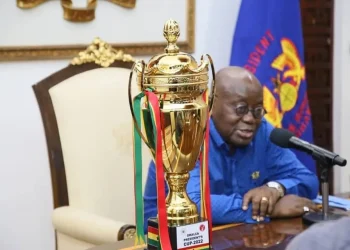President Nana Addo Dankwa Akufo-Addo has said that removing taxes on petroleum products will reduce government revenues by some four billion cedis.
At this time, he said when the government is determined to expand Government revenues in order to increase our capacity to finance our own development, can we afford to reduce tax revenues by four billion cedis (GH¢4 billion)?
Government is currently confronted by very tight financing conditions, in the wake of inadequate domestic revenue mobilisation, he said.
The Trades Union Congress (TUC) earlier made some demands from government following the rising cost of living in Ghana due to the high fuel prices.
Secretary-General of the TUC, Dr Yaw Baah in a letter he wrote to the Finance Ministry on Monday, March 21, “The situation must be addressed without further delay, otherwise many more Ghanaians will be pushed into destitution,” Dr Baah warned in the letter.
The letter noted how fuel prices have increased astronomically since January, obviously impacting cost of living.
“We propose that Government must immediately suspend all taxes and levies on petrol, diesel, LPG, and kerosene.
“This should bring down prices of these fuel products by an average of about 15 percent.
“The suspension should remain in force until the international price of crude oil stabilises and the decline of the Cedi has been halted.”
But speaking at this year may day celebration on Sunday May 1, he said “Indeed, some of the revenues from these same taxes on petroleum products is what is used to pay some of the salaries of some of the seven hundred thousand (700,000) public sector workers on Government’s payroll. We are addressing the issue of fuel price increases by implementing measures that are succeeding in stabilising the exchange rate, a key determinant of fuel prices. Government is also working hard to ensure reliable supply and availability of petroleum products, thereby preventing shortages, a phenomenon which is being experienced in some other neighbouring countries. By the same token, we are keeping the lights on in Ghana.
“We should bear in mind that, even though we are a modest producer of crude oil, with a current output of one hundred and forty-eight thousand (148,000) barrels per day, we are still a net importer of petroleum products. We, therefore, continue to be vulnerable to the price volatilities of the world market for petroleum products.
“Nonetheless, intense efforts are being made to rehabilitate the Tema Oil Refinery, to enable it contribute to stabilising petroleum prices, which should see the light of day very soon. We are also encouraging private companies to establish refineries in the country, one of which is eighty percent (80%) complete, and is expected to be commissioned before the end of this year.
“Secretary General, as we work to address these issues, we cannot take adhoc measures that will only give temporary reprieve, and only aggravate the situation even more in the medium to long-term. As much as possible, let us use existing institutions and sustainable measures to address these concerns.
“With respect to emoluments for article 71 office holders, which, according to official data, constitute less than one percent (1%) of tax revenues, we have to deal with issues of equity within our constitutional framework, and call for the collaboration of the Executive and Legislature to address the issue.”
source: 3 News


















































